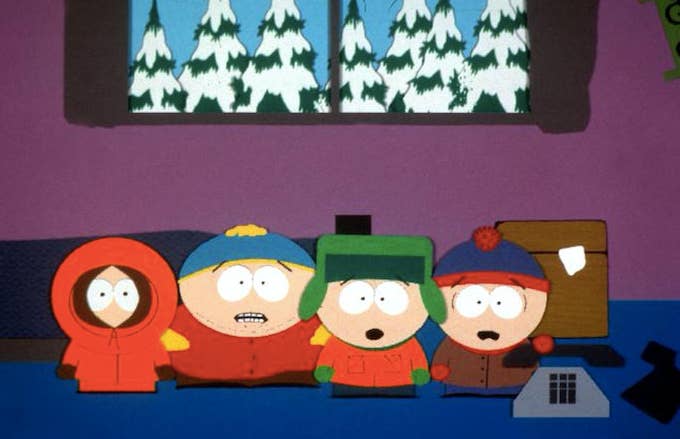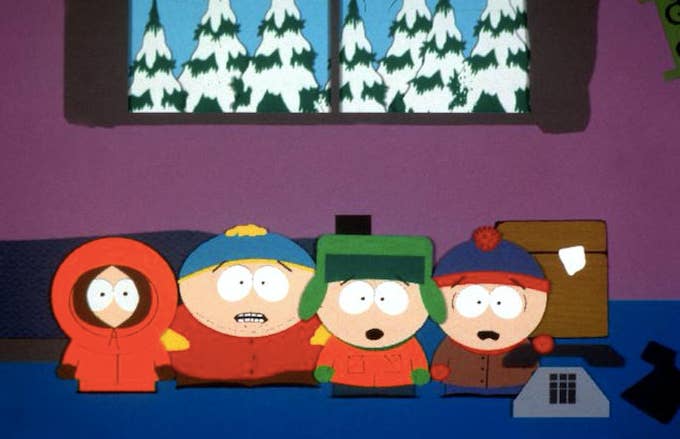
South Park is one of television's longest-running shows, a 20-seasons-and-counting award-winning cultural behemoth that has spawned movies, imitations, and countless time-wasting memes.
But could the show be, at least in part, responsible for one of the scariest political movements of the present moment? Lindsey Weedston thinks so.
Weedston, a 29-year-old writer from Bothell, Washington, penned an article for The Establishment recently which argued that the show helped lead to the rise of the alt-right. The piece, "How 'South Park' Helped Empower the Alt-Right," grabbed my attention enough that I decided to call her up and see why exactly she thought Kyle, Cartman, and crew led us to Richard Spencer, 4Chan, and Charlottesville. Our conversation, edited lightly for length and clarity, is below.
To start off, how does South Park treat what some people might think of as "PC culture"?
I read a post that explained this really well—South Park’s highest moral goal is to not care. It treats PC culture as [if] the opposite of PC culture is not to care about anything.
So caring about an issue is basically stupid, and pretty much every episode goes back to: it doesn’t matter, being PC is uncool, and not giving a fuck about anything is the way you should feel.
In your article you trace a history of that attitude, starting with the misinterpretation of a character in an Oliver Stone movie. Can you take me through that?
That was interesting. So [the 1987 movie] Wall Street, I didn’t know before I researched for the article that Oliver Stone actually meant it the opposite of how so many people took it. Wall Street was supposed to be an indictment of Wall Street and the type of person that thinks greed is good.
It was very interesting to find that so many people actually went with the mantra "greed is good," and it seems like that has shaped a lot of our culture. Now we have prosperity Christianity—actually telling people that God wants them to collect as much wealth as possible.
It’s not just Wall Street. For a long time, our capitalist society has led up to this idea that the ultimate goal is to collect as much wealth as possible. That movie accelerated the idea of collecting all the wealth and power you can.
And then you talk about shock jock’s of the ’80s and ’90s, the Howard Sterns of the world. What does that have to do with the South Park-popularized attitude of caring being uncool?
The original title of this article I pitched was actually "The History of Celebrated Assholes." My first draft of the piece, I ended up researching early forms of shock and asshole comedy. I found out the person considered the first shock jock was actually a black man, Petey Greene. Howard Stern was influenced by him.
It’s really interesting to learn the kind of things he talked about. He was appealing because he was very down to Earth, and he spoke to the black community in a very straightforward way that no white disk jockey had ever before. When Dr. Martin Luther King, Jr. was assassinated, he went on air and started speaking to the community, and is credited with calming the situation down.
You can go on YouTube and find some of the shows and listen to the way he speaks. It’s very colloquial. He just acts like a normal person. I think white people at the time looked at that as being shocking, and that’s why he was labeled as a shock jock.
He was really active in the community. He promoted education and feeding the hungry. He wasn’t an asshole, but history is very interesting. In my original draft, I wrote about how he influenced Howard Stern. Howard Stern was actually invited onto his show. Stern went on in black face and used the n word, and Greene thought it was funny.
Greene died fairly young, so then you move onto Howard Stern’s career. Howard Stern, I’m sure, has done some good stuff in his life. But he is very much associated with the shock jock label, and a lot of what he does is just to rile people up. I think it’s interesting how you have that transition from somebody who was just being real and communicating to his people in a way that made sense to him; and then you have Howard Stern, who makes a lot of money—and in fact an entire career—from pissing people off.
How do you get to the alt-right from that? How does South Park's overall attitude connect to the alt-right?
I believe that South Park's anti-PC messages paved the way for white supremacist groups to recruit much of the largely white male fanbase into what is now referred to as the alt-right, or other groups that are identical in all but name. Matt and Trey promoted this idea that you should be able to say or animate anything you want in the name of satire and humor, and any harm that it caused either didn't exist or didn't matter.
When they experienced backlash for their intensifying mockery of already-vulnerable groups and their attitude of, "Repeating horrible things said by bigots up to and including Nazis is funny because it upsets people," they reacted by depicting their critics as free-speech-oppressing caricatures like the "PC bro." They promoted the idea that marginalized people—trans people, people of color, Jewish people, etc.—speaking out against harm caused by South Park's brand of "humor" and [the show's] "I do what I want" attitude are the real oppressors.
White supremacist groups and their better-at-PR counterpart the "alt-right" use this message constantly to recruit young white men and boys. They tell these kids that they're the ones being oppressed by those telling them that they have privilege, and therefore need to make some effort to at least not use certain words and maybe examine prejudiced attitudes they might have picked up from a culture that is prejudiced in many ways. The alt-right promotes the idea of white male victimization, drawing in youth that has been told by South Park that the plight of marginalized groups doesn't matter and that "political correctness" is oppressing them. Once those groups have their loyalty, they can then indoctrinate these young guys into straight up white supremacist ideas under the guise that "the PC police don't want you to think about this."
I don't think Matt and Trey meant to create an army for the alt-right, but they seem to be leaning into it rather than admitting that they might have messed up.

Cartman plays a big part in your article. He’s often not the hero in the storylines of the individual episodes, but he is a fan favorite. Can you break down why that’s a problem?
Cartman is a perfect representation of satire gone wrong. Just like with Wall Street, the people who view your content take the literal meaning of something instead of taking it as the indictment that it is. It’s pretty clear, especially in the earlier episodes, that you’re not supposed to like Cartman. You aren’t supposed to identify with him. You’re supposed to hate him, or at least understand he is the opposite of the ideal of a human being. That is supposed to be represented in his bigotry, his ignorance, and his appearance as well, with him being fat.
And yet he is a fan favorite, and people do identify with him. I think it was Matt Stone who said he identifies with Cartman more than any of the other characters. I think their original intention was to say, okay, don’t be like Cartman. But instead, you have the opposite reaction of people idealizing his attitude and his selfishness and his desire to make people suffer and his bigotry. He has become a representation of how the fans feel that you should be.
Can you talk about "South ParkRepublicans"—South Parkbeing adopted by right wingers?
That plays into what I think is the logical conclusion of the anti-PC movement. Like I said in the article, there has been a rebellion against this idea of being PC.
Political correctness has evolved into a derogatory term meaning, you are being sensitive to someone. It has become this big boogeyman. There is an idea that there is this social justice warrior, PC police entity who will come and yell at you and punish you if you say what you are actually thinking. So there has been a rebellion against this strawman. It has come down to, if you care about anyone at all, if you want to be sensitive to anyone’s needs, then you’re this politically correct nerd or you’re a nun with a ruler or an authority figure telling people what to do. You are therefore uncool and the enemy.
It’s very reactionary. But it’s so popular and so widespread on the right now, and you actually have people coming out with articles and people in the White House using that rhetoric to help further their political careers.
So it’s really not surprising to me that there articles out there saying South Park is right on actual political issues.
What has followed South Park’s wake?
The first example that comes to mind is a lot of the cultural treatment of trans people. South Park has had some really transphobic content. Even before the Caitlyn Jenner episode, there was the whole treatment of Mr. Garrison and his sex change. I remember the episode where they included footage of an actual gender affirmation surgery, just saying, "look how gross this is." They had a caption like, "This is footage of the actual surgery," as though it’s supposed to be horrible and sad because it’s gross. But any surgery looks gross and disgusting. Their definite goal was to be like, this is gross and this is wrong.
You see a huge amount of transphobia from a lot of alt-right groups. You have these bathroom bills that are trying to keep trans people out of public restrooms, which is basically keeping them out of public life. It’s trying to keep them from having access to any kind of normal life.
The sudden emergence of the bathroom bills surprised me, but maybe it shouldn’t have. It seemed to come out of nowhere, but then you look at the timing and it does kind of follow Caitlyn Jenner’s coming out to the public as a woman. That in itself probably would have gotten some backlash, but then you look at how popular South Park is, and there’s no way it didn’t play a role in people reacting the way they did: reacting like, oh that’s just so gross—their existence is gross and wrong.
You end your essay with a call for what you call radical kindness. What does that mean?
Radical kindness comes from being around young people, specifically in communities that are more social justice-oriented. In my community, I’m seeing a shift towards memes being positive and used to uplift people. I think people are just tired of beating on each other and attacking each other, and the younger generations especially are starting to rebel against that.
I feel like a lot of what my generation, millennials, has put out there has been negative. We’re kind of a depressed generation, so I think younger people are reacting to that and deciding, let’s be nice to each other. In a society where being mean to each other is the norm, kindness is punk. That’s rebelling. That’s what’s cool.


